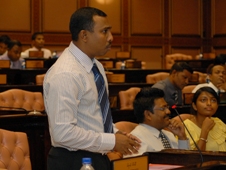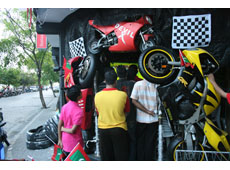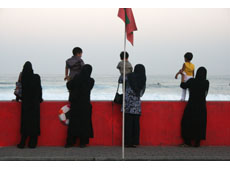President Nasheed is away fighting valiantly to save the country from drowning, lobbying hard for aid and assistance from the developed West at Copenhagen.
At the time of writing, there is talk that Britain should open its borders to climate refugees from Bangladesh. Surely the Maldivians, too, would be glad to find some space in a UK asylum centre or two once the islands go under? Or would they?
The problem is, we are talking about Britain here – the great colonizer, who – according to Adhaalath – ‘enslaved’ the Maldivians for so long. And, as if 78 years of slavery was not enough, once it had granted the Maldives a ‘bogus’ form of independence in 1965, Britain and ‘they in the West’ have been waging a covert war to corrupt the hearts and minds of Maldivian youth with Western decadence and hedonism.
Surely Maldivians would not be accepting any assistance from these people of ‘the West’? I wonder how Adhaalath feels about the manner in which President Nasheed is back-stabbing his valuable political ally, making Faustian pacts with those evildoers. How ungrateful.
One wonders, too, what ‘the West’ would think if they knew what one part of the government, represented by the genial President Nasheed with his charm and show-stealing ideas for saving the world, really thinks of ‘them’.
Maldivian history, á lá Adhaalath
According to Adhaalath, the Maldives was a British colony from 1887 to 1965. The difference between being a colony and a protectorate may have been lost at sea.
The numerous countries that were colonised, whose identities were robbed, languages stolen, who were forcibly ‘civilised’, made victims of rape and pillage, who fought centuries-long wars of independence, against whom genocides were committed, and whose lands have been forcibly occupied by the ‘civilised settlers’ – they may feel a wee bit peeved at the loss of distinction between colony and protectorate.
But, let’s not be pedantic. Adhaalath says the Maldives was colonised, and not just by the British, but also ‘others’.
History has always been a bit murky in the Maldives. Take for instance the official narrative of how the Maldives converted to Islam in 1153 – the Infidel genie was (literally) put into a bottle by a visiting Moroccan Muslim scholar pretending to be a sacrificial virgin girl (don’t ask), and, voila! All Maldivians became 100 per cent Muslim overnight with no force, no blood shed, nothing.
Anyway, the other ‘colonisers’ that Adhaalath says enslaved the Maldives were individuals – an Andre Andre and a Raja with a double-barrel name. According to the dictionary, a colony is a country that is under the control of another country, not a wayward traveler (even if a Raja) or possibly the captain of a pirate ship (even if he sounds as good as Captain Jack Sparrow). But, never mind. Gratuitous pedantry can be unbecoming, and should be avoided.
The West, according to Adhaalath, once its colonies were lost, remained determined to infiltrate the beautiful Muslim world, with its strong community spirit, always living in peace bound by their strong faith in the Ummah.
You have to admit, you would be hard put to find a Muslim community in conflict in the twenty-first century.
This beautific Muslim world would have remained forever happy, if not for the stealthy shenanigans of the pseudo-intellectuals of the West. ‘They’, according to Adhaalath, have infiltrated Muslim societies such as the Maldives, luring the youth into materialism and philosophies of individualism through promises of education and progress.
Masking their jealousy and anger under benevolence, they have seduced Muslim youth with atheist and agnostic theories. This has been the ultimate goal of the West, their hidden agenda – the undermining of the firm religious belief that has been at the very core of the Muslim identity. This is the ‘neo-colonialism’ that the West now pursues, and it is aimed at Muslim youth.
Alas, the Maldivians have become easy victims, forgetting the beautiful ‘Islamic culture’ that made them Maldivians, forgetting centuries of tradition and culture.
Lost culture, or lost mind?
What is this ‘Islamic culture’ that Adhaalath accuses the West of stealing from the Maldives? Are they referring to the custom among Maldivian women that dictated they go topless until their first periods, no matter how old or how well endowed they became in the meantime?
According to the writings of the 14th Century Muslim explorer, Ibn Batuta, Maldivian women chose to ignore his criticism of the said custom when he came across it in his travels, and continued to practise it for many years after.
Dare it be said that in the ‘shameless’ West, women were literally swallowed up by cloth around the same time?
Perhaps Adhaalath is referring to the ‘Islamic culture’ of the free and fiery nature of Maldivian women much admired by Marco Polo in his travels? Or is it the ‘Islamic culture’ in which women reigned as queens for many years?
When Adhaalath says that the West has taught the Maldivian women – through the media – to sing and dance and expose themselves, are they referring to the women of the Thoddoo Badiyaa group and their ilk? Surely these pretty girls in their little pleated frocks and frizz-bomb hair did not learn how to powder their faces with white Cuticura and paint their lips with crepe paper from the West?
Hands up anyone who thinks that the dance moves of these women were learned from the West. Even the best of Top of the Pops did not figure a single move similar to the ones these ladies specialised in, waving their hair to the right and left so vigorously that one was afraid a head or two might fly lose at any time.
Or is the ‘Islamic culture’ that Adhaalath talks about the one that is reflected in the Maldivian women’s traditional clothing? You know, the dress with a neckline that plunges so deep that even Dolly Parton would blush, or the accompanying skirt that cannot even be bothered with stitching but wraps around the waist with a slit that goes up to the waistline itself?
Or is the ‘Islamic culture’ they want to protect the one where the Maldives once held the highest divorce rate in the world? Or the one where women ran after men going ‘Eid bolah gon’, accosting men from behind in a move that would have shocked even their ‘shameless’ Western contemporaries for its forwardness in pursuing potential husband material? Mr Darcy would never have been won with such unladylike displays.
Again, what ‘centuries of Islamic culture’, exactly, is it that the Maldives is losing because of the West?
Adhaalath is painting a false picture of a particular kind of ‘Islamic Maldives,’ that has never existed, then accuses the West of stealing it. The Maldives has been an Islamic nation for centuries, yes, but it has never had the culture that Adhaalath laments the loss of.
Rewriting history
Maldivians have practised and believed in the religion undisturbed, in their own way. Adhaalath wants the Maldives to forget whatever history that has been recorded, and pretend that Maldivians have been living the lives of some other people, following rules of a society and tradition these unassuming islanders have never before been familiar with.
Is the idea to get the Maldivian women to follow the ‘natural order’ of submissiveness while getting the men worked up about having a false identity stolen from them, and pitch them against ‘the West’ in an imaginary battle of civilizations that does not exist? These writings of Adhaalath are familiar and can be heard in the voices of those very same radical preachers who are recruiting vulnerable young people into a ‘war’ against an imagined enemy in the name of the ‘West’.
A Faustian Pact
Now, in the unlikely event that President Nasheed does manage to secure aid and other assistance from ‘the West’ to help save the Maldives from climate calamity, would Adhaalath be in favour of accepting the help?
Surely that would be hypocritical? Would it not be better to find a way to decamp to a burning hot desert somewhere where the women could keep their natural timidity and shyness intact under 500 yards of cloth, walk five steps behind her boss/husband, and breed in the safety of their tent while the man milks the camel while bravely battling the elements?
The children reared by the docile women and uncorrupted by the West can then go sacrifice themselves for the greater good in the mountainous terrain of Afghanistan.
The true Maldivian culture, the one that Maldivians did not know was theirs until it was revealed by Adhaalath, will then be able to blossom and bloom – finally letting Maldivians be independent, and free to be real Dhivehin.
It is becoming more and more clear that, yes, the chances are that the Maldives is destined to drown if it is not saved. What is harder to predict is which waters will sink it – the rising sea levels, or the ‘holy’ muck being used to brainwash its people.
Munirah Moosa is a journalism and international relations graduate. She is currently engaged in research into the ‘radicalisation’ of Muslim communities and its impact on international security.
All comment pieces are the sole view of the author and do not reflect the editorial policy. If you would like to write an opinion piece, please send proposals to [email protected]
Likes (2)Dislikes
(2)Dislikes (0)
(0) 







